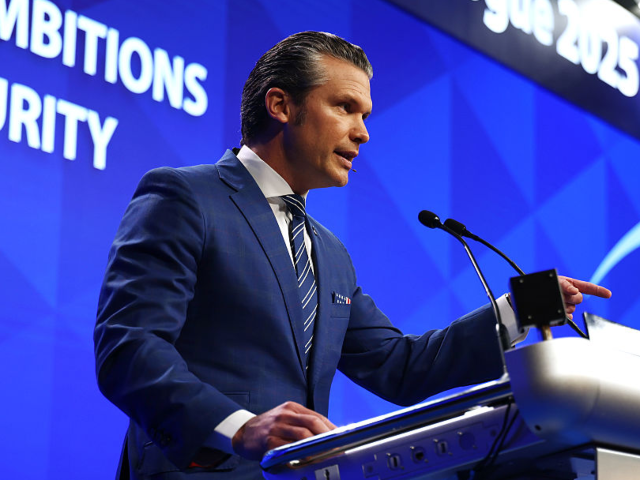Beijing: Pete Hegseth Calling Out China’s Territorial Claims Is Unfair ‘Bullying’

The Chinese Defense Ministry published an incensed screed on the regime-controlled messaging application WeChat on Sunday condemning Secretary of Defense Pete Hegseth for warning Asian allies not to trust Beijing, accusing him of bullying.
Hegseth delivered the offending remarks at the Shangri-La Dialogue, an annual defense conference in Singapore. He stated plainly that China “seeks to become a hegemonic power in Asia,” actively using its military to harass and, in some cases, attack its neighbors in the South China Sea, as well as to create a longstanding threat of war with Taiwan.
“We cannot look away, and we cannot ignore it. China’s behavior towards its neighbors and the world is a wake-up call. And an urgent one,” Hegseth warned.
The secretary of defense has not shied away from highlighting communist China’s colonialist tendencies towards its neighbors and the threat the Communist Party poses in countries such as Panama. His speech at the Shangri-La Dialogue followed a particularly difficult week for China and its relationship with the United States as the administration of President Donald Trump announced new policies to limit entry into the country for Chinese students tied to the Communist Party. Multiple reports have also indicated an increasing number of incidents by Chinese civilians protesting, rioting, or engaging in disruptive acts to protest circumstances related to the country’s slowing economy.
The Chinese Defense Ministry statement published on Sunday specifically address the situation regarding Taiwan — using menacing language to hint at a potential invasion, which Hegseth had highlighted in his speech — and in the South China Sea, where China incorrectly claims territory belonging to five other nations. Taiwan is a sovereign nation with an entirely independent government apparatus from China, yet the Communist Party claims authority over the state as a rogue “province” and treats its democratically elected government as a rogue “separatist” movement. In the South China Sea, Beijing exerts control over maritime territory belonging to Taiwan, Brunei, Malaysia, the Philippines, and Vietnam. Chinese ships have regularly attacked ships belonging to those nations in their own waters for over a decade.
“The U.S. is accustomed to creating disputes, inciting confrontation, and pursuing selfish interests at the Shangri-La Dialogue,” Chinese Defense Ministry spokesman Zhang Xiaogang wrote in the angry WeChat missive. “The remarks made by the U.S. defense secretary were filled with deeply ingrained hegemonic logic, bullying behavior, and Cold War mentality.”
“They seriously provoke China’s sovereignty and interests… We express strong dissatisfaction and resolute opposition to this,” the statement continued, according to a translation by the Chinese regime-controlled newspaper Global Times.
On Taiwan, Zhang condemned what he claimed to be “irresponsible remarks” by Hegseth, then added a threat to “crush” the existence of Taiwan as an independent nation.
“The Chinese People’s Liberation Army will resolutely defend national sovereignty and territorial integrity, and will firmly crush any ‘Taiwan independence,’” his statement concluded.
In his remarks in Singapore on Friday, Hegseth described “deterring aggression by Communist China” as a key Trump administration objective.
“China seeks to become a hegemonic power in Asia. No doubt. It hopes to dominate and control too many parts of this vibrant and vital region,” the defense secretary suggested.
“We are watching very closely China’s destabilizing actions. And any unilateral attempt to change the status quo in the South China Sea… is unacceptable,” he declared. “Any attempt by Communist China to conquer Taiwan by force would result in devastating consequences for the Indo-Pacific and the world.”
“There’s no reason to sugarcoat it. The threat China poses is real,” he asserted. “And it could be imminent. We hope not. But it certainly could be.”
Hegseth promised that America would “stand with you,” referring to members of Indo-Pacific governments in attendance, “and work alongside you to deter Chinese aggression.”
The Chinese government has repeatedly taken offense to Hegseth’s direct approach to addressing the threat presented by Beijing. Chinese officials declared Hegseth traveling to Panama in April, for example, a “malicious attack,” despite the longstanding historical alliance between the United States and Panama. Hegseth, like Trump, has stated repeatedly that Chinese influence around the Panama Canal poses a threat to international shipping and, thus, American interests, and similarly raised the issue at the Shangri-La Dialogue.
Before Hegseth traveled to Panama, in March, the Chinese Foreign Ministry condemned Hegseth for remarks to the press in which he stated, referring to China, “Those who long for peace must prepare for war.”
“The rhetoric of the U.S. official is aimed at fueling ideological confrontation and spreading so-called ‘China threat’ that doesn’t exist,” Foreign Ministry spokesman Lin Jian fumed, a day after threatening “any other type of war” against America if President Trump did not lift tariffs on Chinese products.
President Trump first announced his intent to raise tariffs on Chinese goods prior to his second term in office, indicating that China’s espionage, intellectual property theft, human rights abuses, and alleged role in supplying the ongoing fentanyl crisis in America required the United States to act to protect its citizens. Following the imposition of such tariffs, multiple reports from human rights organizations and independent journalists have indicated that Chinese factories are struggling to pay their workers, many of whom regularly face abuses in the workplace. Reports in April described hundreds of Chinese workers leaving shut-down factories in their wake; one man was reportedly arrested in May for setting fire to a factory in Sichuan over not receiving back wages.